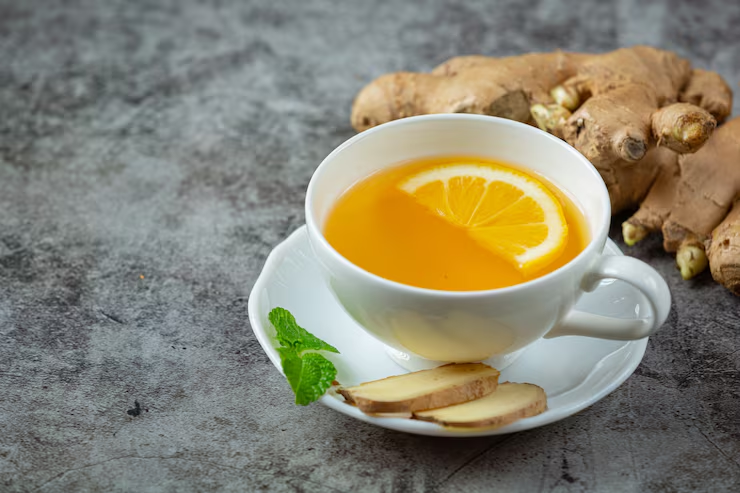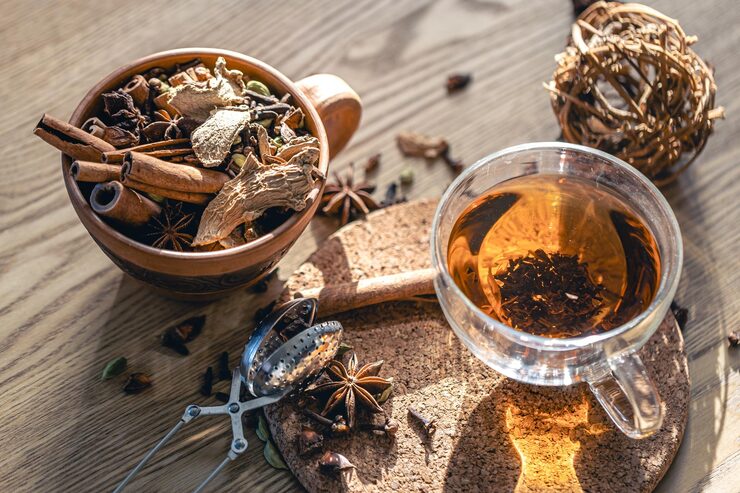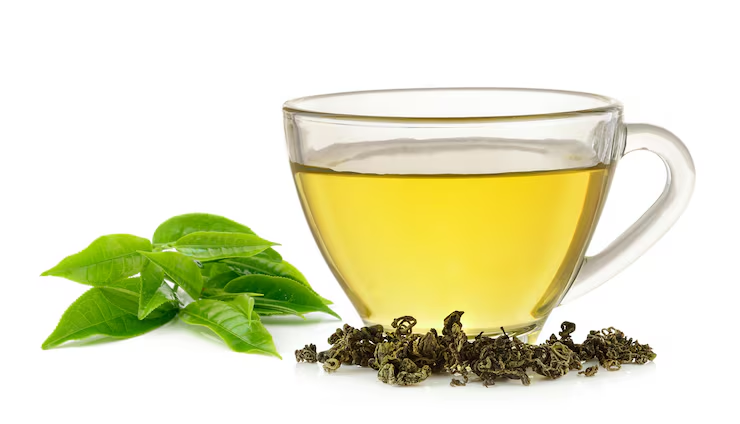Teas for lung health have become a natural go-to remedy for those seeking to support their respiratory system in today’s polluted and stressful world. With rising concerns about air quality, allergies, and chronic respiratory conditions, herbal teas offer a gentle, effective way to cleanse and strengthen the lungs without harsh chemicals or medications.
Many herbal ingredients commonly found in these teas—such as mullein, licorice root, thyme, ginger, and peppermint—act as expectorants, anti-inflammatories, and antioxidants. Mullein helps clear out mucus, licorice soothes irritated airways, and ginger reduces inflammation, making it easier to breathe. These ingredients work together to support clearer, healthier lung function over time.
Including teas for lung health into your daily wellness routine can make a meaningful difference. Whether you’re dealing with respiratory issues or simply want to detox and breathe easier, a warm cup of herbal tea may be the natural boost your lungs need.
In this in-depth article, we’ll explore the top 8 best teas for lung health, including their benefits, how to brew them, and expert tips to maximize their effects. Whether you’re a tea lover or a wellness seeker, this guide will help you breathe a little easier—naturally.

🌿 Why Herbal Teas Are Beneficial for Lung Health
Herbal teas have been used for centuries in traditional medicine to support respiratory wellness. Here’s why they’re so effective:
Anti-inflammatory: Many lung problems, such as asthma and bronchitis, are linked to inflammation. Herbal teas help reduce this.
Expectorant properties: Certain teas help break up mucus and clear the airways.
Antioxidants: Protect lung tissues from oxidative stress and pollution.
Antibacterial and antiviral: Help fight infections that affect the respiratory tract.
☕ Top Teas for Lung Health
Mullein Tea
Mullein tea is one of the most effective teas for lung health, valued for its powerful ability to cleanse the respiratory system. Made from the leaves and flowers of the mullein plant, this herbal tea acts as a natural expectorant, helping to loosen and expel mucus from the lungs, making breathing easier.
Rich in anti-inflammatory and antioxidant properties, mullein tea soothes irritated airways and reduces inflammation, which is especially beneficial for those with asthma, bronchitis, or chronic cough. As one of the most trusted teas for lung health, it also has antibacterial effects that support your body in fighting off respiratory infections.
To make mullein tea, steep dried mullein leaves in hot water for about 10 minutes and strain thoroughly to remove any fine hairs. Drinking this tea regularly as part of your teas for lung health routine can help detox your lungs, calm persistent coughing, and support long-term respiratory wellness naturally.
Best For: Clearing congestion, asthma, dry cough
Benefits:
Acts as a natural expectorant
Soothes inflammation in the lungs and throat
Eases symptoms of bronchitis and asthma
How to make:
Steep 1–2 teaspoons of dried mullein leaves in hot water for 10–15 minutes.
Strain carefully as the leaves can be fuzzy.
Drink 1–3 cups daily.
SEO Tip: Mullein tea for lungs is a highly searched phrase—include it in your blog or content titles.
Ginger Tea

Ginger tea is one of the most powerful and widely used teas for lung health. Known for its warming and soothing effects, ginger contains active ingredients like gingerol, which provide strong anti-inflammatory and antioxidant benefits. These properties help reduce airway inflammation, making breathing easier and relieving symptoms of respiratory discomfort.
Drinking ginger tea regularly can help loosen mucus in the lungs, allowing it to be expelled more easily. This makes it particularly helpful for individuals coping with colds, allergies, asthma, or chronic bronchitis. As one of the top teas for lung health, it also enhances circulation and boosts immune function, supporting overall well-being.
To enjoy its benefits, steep fresh ginger slices or use high-quality organic ginger tea bags in hot water for 5–10 minutes. including it into your daily routine, especially in the morning or before bed, can offer long-lasting respiratory relief and strengthen your lungs naturally. Best For: Fighting infections, detoxifying lungs
Benefits:
Strong anti-inflammatory and antioxidant properties
Stimulates circulation to help remove toxins from the lungs
Aids in relief from throat irritation and coughing
How to Make:
Slice fresh ginger (1–2 inches) and simmer for 10 minutes in water.
Add lemon or honey for added benefits.
Consume 2–3 times daily during a cold or allergy season.
Pro Tip: Ginger tea pairs well with turmeric or cinnamon for an extra anti-inflammatory boost.
Licorice Root Tea

Licorice root tea is a soothing and effective option among the best teas for lung health. Known for its naturally sweet flavor and medicinal qualities, licorice root contains glycyrrhizin—a ingredient with powerful anti-inflammatory and immune-boosting properties. It helps calm irritated airways and supports overall respiratory comfort.
This herbal tea acts as a natural demulcent, forming a protective layer over the throat and bronchial lining, which makes it especially helpful for dry coughs, sore throats, asthma, and bronchitis. As one of the more versatile teas for lung health, licorice root also works as a mild expectorant, helping to clear mucus and ease breathing.
To prepare, steep dried licorice root in hot water for 5–7 minutes. Drink it in moderation, as excessive intake may affect blood pressure. Used mindfully, licorice root tea can be a valuable addition to your teas for lung health routine, promoting lung function and long-term respiratory well-being. Best For: Soothing airways, chronic coughs
Benefits:
Calms the mucous membranes of the lungs
Acts as a demulcent (protective film over mucous membranes)
May ease asthma symptoms
Caution: Not suitable for people with high blood pressure or kidney issues if consumed in large amounts.
How to make:
Steep 1 tsp dried licorice root in boiling water for 5–7 minutes.
Drink 1–2 cups daily (short-term use recommended).
Peppermint Tea
Peppermint tea is a refreshing and therapeutic choice among popular teas for lung health. It contains menthol, a natural ingredient known for its ability to relax the muscles of the respiratory tract and promote easier breathing. The cooling sensation of peppermint also helps soothe irritated throats and reduce inflammation.
As one of the most accessible teas for lung health, peppermint tea can help clear congestion, loosen mucus, and support airflow in the lungs. It’s particularly useful during cold or allergy seasons when sinus and chest congestion become more common. Its antibacterial and antiviral properties may also aid in fighting off respiratory infections.
To enjoy peppermint tea, steep fresh or dried peppermint leaves—or a quality tea bag—in hot water for about 5–10 minutes. Sipping it daily can provide a refreshing boost to your respiratory wellness. When included regularly in your routine, peppermint tea offers gentle, natural support for healthy lungs.
Best For: Decongestant, asthma relief
Benefits:
Menthol helps relax respiratory muscles
Acts as a natural decongestant
Eases nasal and chest congestion
How to make:
Steep 1 tablespoon fresh peppermint leaves or 1 bag for 5–10 minutes.
Inhale steam while sipping for extra relief.
SEO Tip: Include related terms like “tea for sinus congestion” or “peppermint tea for asthma” to increase search visibility.
Thyme Tea
Thyme tea is a powerful herbal remedy and one of the most underrated teas for lung health. Packed with antibacterial, antiviral, and expectorant properties, thyme helps the body fight respiratory infections while loosening and clearing mucus from the lungs. It’s especially useful for colds, coughs, bronchitis, and even mild asthma symptoms.
Thyme contains thymol, an ingredient known for its ability to relax the respiratory muscles and ease coughing. As one of the most effective teas for lung health, thyme tea can also help reduce inflammation in the bronchial tubes and support easier breathing, making it ideal during cold and allergy seasons.
To prepare thyme tea, steep 1–2 teaspoons of dried thyme in hot water for 10 minutes, then strain. Add lemon or honey for added flavor and benefits. including thyme tea into your daily routine can naturally support lung function and strengthen your respiratory system over time. Best For: Coughs, bronchitis, bacterial infections
Benefits:
Antimicrobial and antispasmodic properties
Clears mucus and fights respiratory infections
Rich in vitamin C and A
How to make:
Steep 1 tsp dried thyme in hot water for 10 minutes.
Drink up to 3 cups daily when experiencing respiratory issues.
Green Tea
Green tea is not only known for its overall health benefits but also stands out as one of the most effective teas for lung health. Rich in antioxidants like catechins and polyphenols, green tea helps reduce inflammation in lung tissues and protect cells from oxidative stress caused by pollution and toxins.

Its anti-inflammatory and antimicrobial properties make green tea beneficial for those with respiratory conditions such as asthma or chronic bronchitis. As one of the gentlest yet most powerful teas for lung health, it may also aid in improving lung function and boosting the immune system to fight off infections.
To enjoy its benefits, steep high-quality green tea leaves in hot (not boiling) water for 2–3 minutes. Drinking one to two cups a day can provide lasting respiratory support. When combined with other herbal teas for lung health, green tea enhances your body’s ability to cleanse and strengthen your lungs naturally.
Best For: Antioxidant boost, reducing lung inflammation
Benefits:
Contains polyphenols that reduce inflammation
Supports detoxification of the lungs
Studies suggest it may reduce risk of lung cancer
How to make:
Steep green tea leaves or a bag for 2–3 minutes in hot (not boiling) water.
Best consumed without sugar.
Pro Tip: Matcha, a powdered green tea, offers even more concentrated antioxidant benefits.
Osha Root Tea
Osha root tea is a traditional herbal remedy long valued for its powerful respiratory benefits, making it a standout among teas for lung health. Native to the Rocky Mountains, osha root contains natural oils and ingredients that help open up the bronchial passages and ease breathing, especially during colds or flu.
Known for its antiviral, antibacterial, and anti-inflammatory properties, osha root tea supports the body in fighting respiratory infections while soothing irritated throat and lung tissues. It also acts as a natural expectorant, helping to clear mucus from the lungs—an essential feature of effective teas for lung health.
To prepare osha root tea, simmer small pieces of the root in water for 10–15 minutes. Due to its potency, it’s best consumed in moderation and not used long term. When used occasionally, osha root tea can be a powerful addition to your teas for lung health regimen, offering deep respiratory support. Best For: Opening airways, immune support
Benefits:
Promotes better oxygen flow to lungs
Antiviral and antibacterial properties
Helps reduce throat irritation
How to make:
Simmer 1 tsp dried osha root in hot water for 10–15 minutes.
Best taken during seasonal colds or flu.
Caution: Use under guidance; osha is potent and should not be used long-term.
Turmeric Tea
Turmeric tea is a golden, anti-inflammatory powerhouse and a valuable addition to any routine focused on teas for lung health. Its active ingredient, curcumin, is well-known for fighting inflammation throughout the body, including in the lungs. This makes turmeric tea especially helpful for conditions like asthma, bronchitis, and chronic lung inflammation.
As one of the most beneficial teas for lung health, turmeric tea helps reduce oxidative stress, clear toxins, and support overall respiratory function. It may also boost the immune system, helping your body resist infections that can compromise lung health. Pairing turmeric with black pepper enhances curcumin absorption and maximizes its effects.
To make turmeric tea, simmer 1/2 teaspoon of turmeric powder (or fresh root) in hot water for 10 minutes. Add black pepper, lemon, or honey to enhance flavor and benefits. Enjoying this tea regularly can naturally strengthen your lungs and improve your body’s resilience to respiratory challenges. Best For: Reducing lung inflammation, COPD support
Benefits:
Powerful anti-inflammatory due to curcumin
Fights free radical damage in lung tissue
May reduce symptoms of chronic lung disease
How to make:
Mix ½ tsp turmeric powder in warm water with black pepper (enhances absorption).
Add honey or lemon to improve taste.
🌬️ Expert Tips to Maximize the Benefits of Teas for Lung Health
To get the most out of teas for lung health, consistency is key. Drinking 1–2 cups daily ensures that your body regularly receives the herbs’ healing properties. Choose organic, high-quality loose leaves or tea bags to avoid added chemicals and preserve the tea’s natural benefits.
For stronger effects, steep your tea properly—usually 5 to 10 minutes—to extract the full medicinal value. Enhance absorption by adding ingredients like black pepper (with turmeric) or honey (for soothing the throat). Rotate different teas for lung health like mullein, ginger, or thyme to give your lungs a wide range of support.
Hydration is also vital—herbal teas can supplement your water intake while helping thin mucus. Pair these teas with deep breathing exercises, a clean-air environment, and a nutrient-rich diet to support full respiratory health. These expert tips will help you maximize the healing power of teas for lung health naturally.
Drink Consistently but Mindfully: Consume 1–3 cups daily during allergy or flu season. Avoid excessive intake, especially of potent herbs like licorice or osha root.
Use Organic Ingredients: Choose organic herbs or teas to avoid pesticide contamination, which can irritate the lungs.
Combine with Steam Inhalation: For added decongestant benefits, inhale the steam of your tea before drinking.
Add Natural Boosters: Include lemon (vitamin C), honey (antibacterial), or black pepper (enhances curcumin absorption) to enhance medicinal effects.
Avoid Dairy with Tea: Dairy can increase mucus production. Drink herbal teas without milk for optimal lung benefits.
Practice Deep Breathing While Sipping: Pair your tea ritual with deep breathing or meditation to improve oxygen intake and relaxation.
Avoid Smoking and Secondhand Smoke: Herbal teas work best when lungs aren’t constantly under toxic stress. Stop smoking to allow natural detoxification.
Stay Hydrated: Teas are part of your fluid intake. Aim for 8+ glasses of water daily to help thin mucus and support lung detox.
🌱 Supporting Lung Health Naturally Beyond Tea
While teas for lung health are a gentle and effective remedy, other natural practices can further support strong, clear lungs. Regular physical activity, especially aerobic exercises like walking or swimming, helps strengthen lung capacity and improves oxygen flow throughout the body.
Diet also plays a crucial role. Eating foods rich in antioxidants—such as leafy greens, berries, garlic, and turmeric—can reduce inflammation and protect lung tissue from damage. Staying well-hydrated, in addition to drinking teas for lung health, helps thin mucus and makes it easier for your lungs to clear out toxins.
Other supportive habits include practicing deep breathing or diaphragmatic breathing, avoiding exposure to pollutants and smoke, and using air-purifying plants at home. When combined with teas for lung health, these natural methods create a complete approach to respiratory wellness, keeping your lungs strong, clear, and functioning at their best.
Air purifiers: Use at home to reduce indoor pollutants.
Regular exercise: Supports lung capacity and oxygen efficiency.
Avoid pollutants: Wear masks when exposed to smoke, dust, or chemicals.
Eat antioxidant-rich foods: Berries, leafy greens, and citrus fruits protect lung tissue.
Quit smoking: Nothing improves lung function faster than ditching tobacco.
Conclusion

In today’s environment, taking care of your respiratory system is more important than ever. including teas for lung health into your daily routine is a simple, natural way to support your lungs and boost overall wellness. These herbal teas offer powerful benefits, from reducing inflammation to clearing mucus and easing breathing.
Whether you choose mullein, ginger, peppermint, or turmeric, each blend of teas for lung health brings its unique healing properties. Drinking them regularly not only supports lung function but also promotes relaxation, hydration, and immune strength—key elements for maintaining respiratory health over time.
When combined with a healthy lifestyle, clean air, and mindful breathing, teas for lung health can be a valuable part of your wellness toolkit. So pour yourself a warm, healing cup and breathe easier—one sip at a time. Your lungs will thank you for the gentle care and daily nourishment.
Your lungs work tirelessly every day—why not show them some love with nature’s best remedies? Teas for lung health are not only delicious but also healing. From clearing congestion to reducing inflammation, these natural brews are your allies in better breathing.
🧠 FAQ
Q1. What are the best teas for lung health ?
Some of the best teas for lung health include mullein, ginger, licorice root, thyme, peppermint, green tea, osha root, and turmeric tea. These teas help reduce inflammation, clear mucus, and support respiratory function naturally.
Q2. How often should I drink teas for lung health ?
For best results, drink 1–2 cups of teas for lung health daily. Consistent intake allows your body to absorb the herbal benefits over time, supporting long-term respiratory wellness.
Q3. Can teas for lung health help with asthma or bronchitis ?
Yes, many teas for lung health contain anti-inflammatory and expectorant properties that may help reduce asthma symptoms and ease bronchitis by clearing airways and soothing irritation.
Q4. Are there any side effects of teas for lung health ?
Most are safe, but some herbs like licorice root or osha should be used in moderation. Always consult a healthcare provider if you’re pregnant, nursing, or on medication.
Q5. Can I combine different teas for lung health ?
Absolutely! Rotating or blending different teas for lung health provides a broader range of respiratory benefits and helps avoid over-reliance on a single herb.



